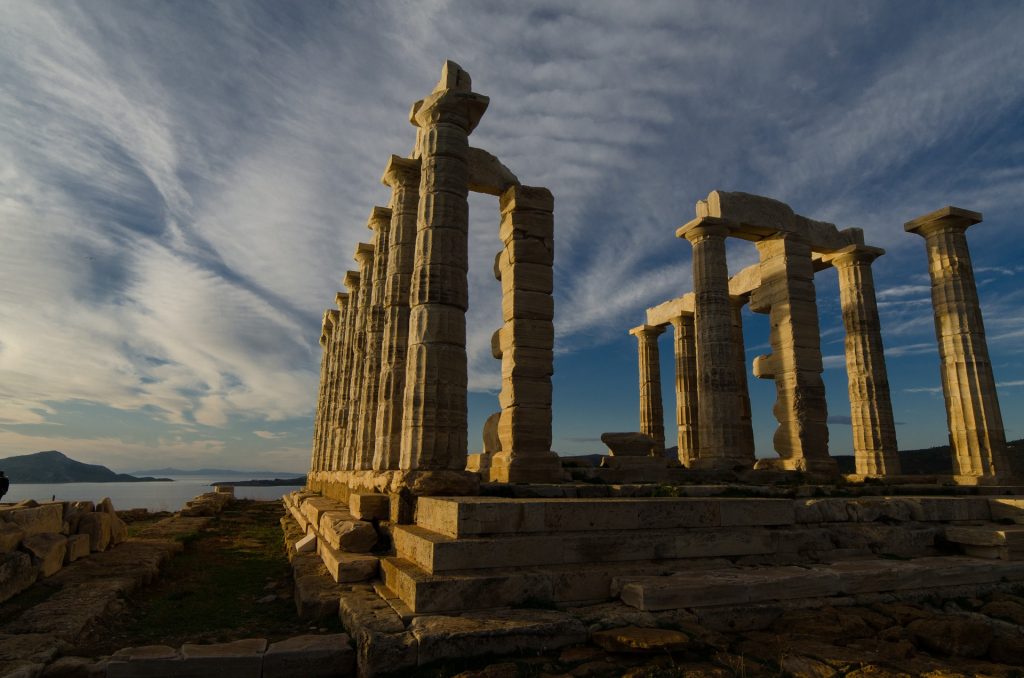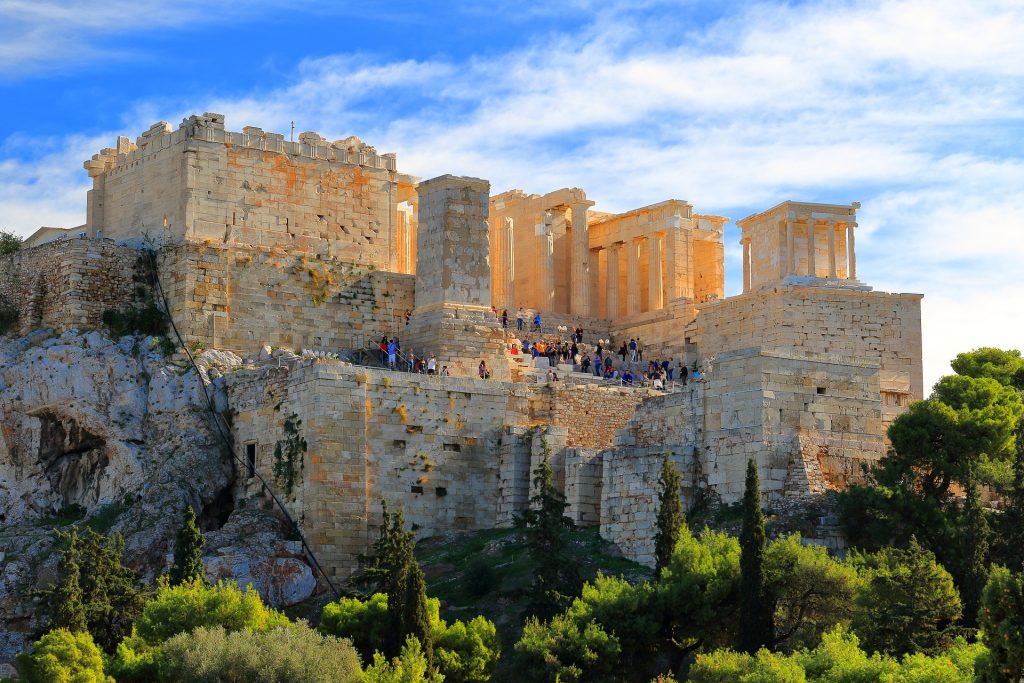In a tour around Greece (Part 1) Posted by Ourania on May 22, 2020 in Culture, Vocabulary
Archaeological sites in Greece are once again open to the public after the almost two-month quarantine! This brought joy to the fans of antiquity all over the world, even though visiting them may still be difficult for many. But what are some of the most well-known sites of this kind? In fact, most are temples of the Olympian Gods! Even though who was included in the 12 Gods of Olympus varied from place to place, they were always 6 men and 6 women. Today, we will review six of them, but for the next 6, you’ll have to wait for the next post. Let’s see who is who and where we can visit their temples.
They are usually referred to as the 12 Gods of Mountain Olympus (Όρος Όλυμπος), where they had their dwellings (η κατοικία των Θεών). They acquired their power over this earthly world after winning the battle against the Titans. But the truth is that they weren’t only 12. In ancient Greece, there were many Gods, some greater, others lesser ones, and who belonged to the top 12 varied from place to place. Later, the Romans adapted them to their needs, sometimes changing their names.
- Dias or Zeus: Δίας / Ζεύς: undoubtedly, the Father of gods and humans (πατέρας Θεών και ανθρώπων) in antiquity, and ruler of the Olympian Gods. Roman name: Jupiter. He was worshiped as the wise God, ruler of the skies, and decider of the fates of humans and moral order (ηθική τάξη). He is usually depicted as a mature, respectable man, holding thunderbolts. He was the God of natural phenomena, protector of the family, fertility and strangers, thus also called Ξένιος Δίας. He was married to Goddess Hera, but he was notorious for his extramarital affairs, which resulted in his many children. The most famous temple dedicated to him can still be found in the center of Athens (Στήλες του Ολυμπίου Διός) – one of the biggest temples of antiquity.
- Hera: Ήρα: Zeus’ wife and Queen of Gods and humans. She was the Goddess – protector of marriage (γάμος), women, and matrimonial life. Roman name: Juno. She is depicted as a beautiful, mature woman, wearing a crown (στέμμα) and holding a scepter (σκήπτρο). She was jealous of her husband’s numerous extramarital affairs and she tried many times to take revenge. No God ever dared go against her will or talk back to her. The most famous temple dedicated to her can be found in Olympia, where ancient Greeks would send gifts before the Olympic Games. Nowadays, it is on this altar that the Olympic Flame is lit to be carried to wherever the Olympic Games will take place next.
- Poseidon: Ποσειδώνας: the God of all waters and seas – and curiously, earthquakes. A mature man, holding a trident (τρίαινα) and usually surrounded by dolphins. Roman name: Neptune. His most famous temple can be found just outside Athens, overlooking the Aegean Sea, on a truly wonderful beach, where the visitor can enjoy one of the most majestic sunsets on this earth! (Ναός του Ποσειδώνα στο Σούνιο).
- Aphrodite: Αφροδίτη: Goddess of beauty, love, sexuality and pleasure – protector of lovers everywhere! She was the most beautiful woman, a stunning beauty! Roman name: Venus. Unfortunately, not many of her temples survive in a good state, not even on her favorite island, Cyprus!
- Aris: Άρης: the God of war and battle. A beautiful and strong young man, usually depicted in armor, holding a sword (σπαθί) and shield (ασπίδα). Roman name: Mars. He was not much liked by other Gods, because he represented the violent aspect of war, and ancient Greeks very rarely dedicated temples to him. We can find one in the ancient Agora (αρχαία Αγορά), in downtown Athens. Later, the Romans changed that and we can find a few in the areas the Romans ruled.
- Athena: Αθηνά: the favorite Goddess of Athenians and protector of the city. She gave us the gift of the olive tree (ελιά)! Roman name: Minerva. Where can you find one of her temples? Up on a rocky hill, called … Acropolis!!! She was a sworn virgin (παρθένα), hence called Αθηνά Παρθένα, and her temple … the Parthenon! She was the Goddess of wisdom (σοφία), and of strategic war. She is depicted wearing armor, holding sword and shield, and having an owl on her shoulder. Always in mutual hatred with God Aris, because they represented two very different aspects of war, him the impulsive and violent side of war (βία), her the strategic war that can be won with the power of the mind (στρατηγική). Naturally, she was the favorite child of her father, Zeus.

Build vocabulary, practice pronunciation, and more with Transparent Language Online. Available anytime, anywhere, on any device.






Comments:
Helene:
Rania’s blog entries are always so interesting! She also works hard to find good examples and photos! Amazing job!
Ourania:
@Helene Thank you, Helene! I’m glad you like the blog 🙂
Carolyn Heard:
I really enjoy reading your blog. Could you publish it in Greek as well as in English for those of us who can read Greek?
Ourania:
@Carolyn Heard I am glad you enjoy this blog. The space I have is limited, therefore I cannot write the same topic in two languages. There are many topics about vocabulary, listening comprehension and grammar and you can practice the language, if you like.
Thank you!
Alexandra:
Thank you so much, Rania, for the great opportunity to travel at least in my mind. 🙂
Τώρα μπορούμε να ταξιδέψουμε νοερά τουλάχιστον. Ευχαριστώ πολύ. Μπράβο σου και πάλι!
Ourania:
@Alexandra Ευχαριστώ πολύ 🙂
Eustathios Stratis:
I like this